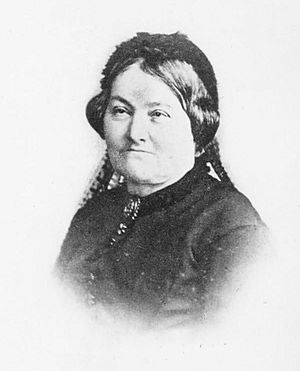Julie von May (von Rued) facts for kids
Julie von May (von Rued) (born February 26, 1808 – died March 5, 1875) was an important Swiss woman who fought for women's rights. She is known as a leading feminist of her time. A feminist is someone who believes in and works for equal rights for women.
In 1868, Julie von May became the leader of the first women's group in Switzerland. This group was called the Association Internationale des Femmes. She believed women should have the right to vote, which is called women's suffrage. However, her main focus was on making sure women and men were treated equally under the law. She is often seen as one of the most important feminists in Switzerland during her generation, along with Marie Goegg-Pouchoulin.
Contents
Julie von May's Early Life and Family
Julia Carolina Elisabeth May von Belletruche was born in Bern, Switzerland. Her family was well-known in Bern. Her parents were Karl Rudolf von Belletruche and Julia von Steiger.
In 1827, she married her cousin, Friedrich Amadeus Sigmund von May von Rued. She moved to his family home in the Canton of Aargau. Her only daughter, Esther, was born in 1840.
Julie's daughter later wrote that Friedrich von May did not pay much attention to his wife. Despite this, Julie helped him with his writing. She did secretarial work for his essays on religion and law. She also took care of him after he was badly hurt in a riding accident. Julie also traveled with her husband.
Fighting for Women's Rights
In 1869, when Julie von May was over 60 years old, she joined the International Women's Association (AIF). This group was based in Geneva and worked for peace and women's rights. She worked closely with Marie Goegg-Pouchoulin, who was a key leader of the AIF.
At a meeting in March 1870, Julie von May spoke about how important it was for women and men to be equal under the law. She said, "we consider the equality of women and men before the law to be one of the most essential and urgent [rights]."
Her Important Essay on Women's Legal Status
In 1872, Julie von May published an essay. It was titled "Die Frauenfrage in der Schweiz zur Bundesrevision am 12. Mai 1872." This essay was about the legal rights of women in Switzerland. The same text had already appeared in the AIF's own magazine in 1870.
Her article referred to the section on "Equalities" in the Swiss Federal Constitution. This part of the constitution said: "All Swiss citizens are equal before the law. In Switzerland there are no covert relationships, no advantages according to place, birth, family or person." (Bundesverfassung 1848, Article 4).
Julie von May used this to argue for women's rights. She reminded Switzerland that it was known as a place where freedom and equality began. Yet, she pointed out that Swiss women had fewer rights than women in other countries. She wrote that Switzerland, "Europe's most mature nation undervalues and infantilises its female part."
She was especially critical because women had to pay taxes and follow criminal laws just like men. But they did not have the same rights or benefits. Julie von May believed this unfair treatment caused many social problems. She felt that women could not help themselves because of their difficult social position.
What Julie von May Demanded
Julie von May listed many things she wanted to change. These included:
- Equal education for girls and boys.
- Fairer taxes for women.
- Equal pay for doing the same work as men.
- Equal rights to inherit property.
- Equal rights regarding property ownership.
- Equality in marriage and divorce laws.
Interestingly, she did not demand political rights for women at that time. She hoped that men would act fairly and give women the help they needed.
How to Achieve Equality
Julie von May knew that men would only agree to these demands if there was strong support from women's rights groups. She also believed that women needed better education. This would help them understand and fight for their legal rights.
She suggested creating women's associations in towns and cities. These groups would teach women about their legal situation. She also wanted girls' schools to teach about law and citizenship. All these local groups should then join together under one national organization. This larger group would have the power to influence laws at the national level.
Julie von May's ideas were practical and reasonable. This was different from Marie Goegg-Pouchoulin, who had more extreme demands. Julie von May's ideas for women to have more independence did not directly go against the traditional views of men and women at the time.
Later Life and Death
In late 1874, Julie von May had a stroke. She never fully recovered from it. She passed away in early 1875 from problems related to the stroke.
See also
 In Spanish: Julie von May para niños
In Spanish: Julie von May para niños
 | George Robert Carruthers |
 | Patricia Bath |
 | Jan Ernst Matzeliger |
 | Alexander Miles |


